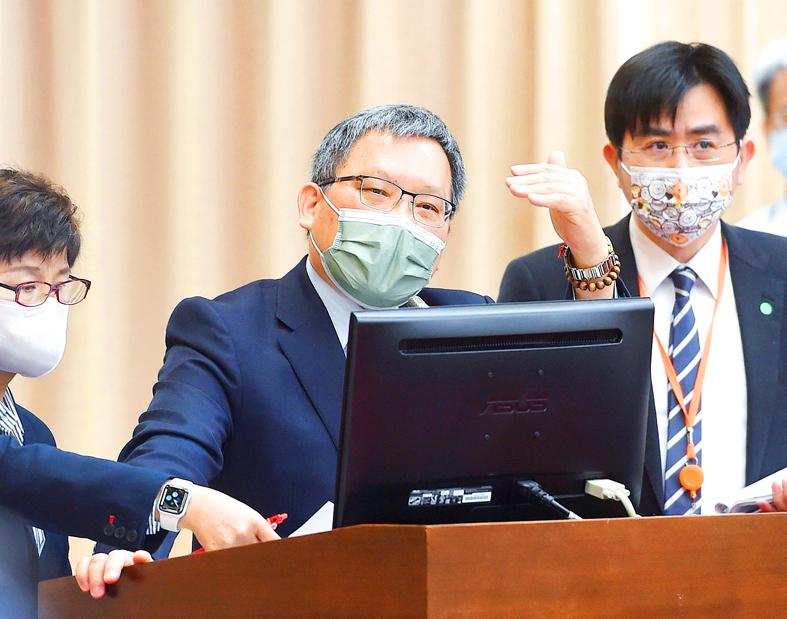The state coffers could benefit from increases in property tax revenue next year, as major municipalities are raising taxes on people who own multiple homes in a bid to discourage property hoarding, Minister of Finance Su Jain-rong (蘇建榮) said yesterday.
Su made the remark at a meeting of the legislature’s Finance Committee after Taoyuan, Taichung, Tainan, Kaohsiung, Hsinchu County and Hsinchu City made known their intentions to raise property tax rates to 3.6 percent on fourth, fifth or sixth homes, effective in July, to ease house hoarding.
Su estimates the additional property tax revenue, due in May, to be slightly less than NT$10 billion (US$351.42 million) per year.

Photo: Fang Pin-chao, Taipei Times
Taipei has set property tax rates at 2.4 percent for second homes and 3.6 percent for third homes. New Taipei City said it would make changes, but has not disclosed percentages. It is the responsibility of local administrators to set property tax rates.
The ministry would review property taxes in May next year to determine if further revisions are necessary, Su said.
Tax bases could also be discussed, he said.
The ministry could monitor how local governments implement property taxes, Su said, adding that Changhua and Kinmen counties have not adjusted property taxes in the past 40 years.
Taxes on multiple homes could help deter rises in housing prices that are caused by property speculation, but could prove ineffective in reversing cost-driven price increases, Su said, adding that developers have attributed ongoing property price hikes partly to soaring building material prices.
The ministry is enhancing its crackdown on tax evasion stemming from owners who have a minimum of 10 homes, with the effort likely extending later to owners with a minimum of five homes, Su said.

GROWING OWINGS: While Luxembourg and China swapped the top three spots, the US continued to be the largest exposure for Taiwan for the 41st consecutive quarter The US remained the largest debtor nation to Taiwan’s banking sector for the 41st consecutive quarter at the end of September, after local banks’ exposure to the US market rose more than 2 percent from three months earlier, the central bank said. Exposure to the US increased to US$198.896 billion, up US$4.026 billion, or 2.07 percent, from US$194.87 billion in the previous quarter, data released by the central bank showed on Friday. Of the increase, about US$1.4 billion came from banks’ investments in securitized products and interbank loans in the US, while another US$2.6 billion stemmed from trust assets, including mutual funds,

AI TALENT: No financial details were released about the deal, in which top Groq executives, including its CEO, would join Nvidia to help advance the technology Nvidia Corp has agreed to a licensing deal with artificial intelligence (AI) start-up Groq, furthering its investments in companies connected to the AI boom and gaining the right to add a new type of technology to its products. The world’s largest publicly traded company has paid for the right to use Groq’s technology and is to integrate its chip design into future products. Some of the start-up’s executives are leaving to join Nvidia to help with that effort, the companies said. Groq would continue as an independent company with a new chief executive, it said on Wednesday in a post on its Web

JOINT EFFORTS: MediaTek would partner with Denso to develop custom chips to support the car-part specialist company’s driver-assist systems in an expanding market MediaTek Inc (聯發科), the world’s largest mobile phone chip designer, yesterday said it is working closely with Japan’s Denso Corp to build a custom automotive system-on-chip (SoC) solution tailored for advanced driver-assistance systems and cockpit systems, adding another customer to its new application-specific IC (ASIC) business. This effort merges Denso’s automotive-grade safety expertise and deep vehicle integration with MediaTek’s technologies cultivated through the development of Media- Tek’s Dimensity AX, leveraging efficient, high-performance SoCs and artificial intelligence (AI) capabilities to offer a scalable, production-ready platform for next-generation driver assistance, the company said in a statement yesterday. “Through this collaboration, we are bringing two

Even as the US is embarked on a bitter rivalry with China over the deployment of artificial intelligence (AI), Chinese technology is quietly making inroads into the US market. Despite considerable geopolitical tensions, Chinese open-source AI models are winning over a growing number of programmers and companies in the US. These are different from the closed generative AI models that have become household names — ChatGPT-maker OpenAI or Google’s Gemini — whose inner workings are fiercely protected. In contrast, “open” models offered by many Chinese rivals, from Alibaba (阿里巴巴) to DeepSeek (深度求索), allow programmers to customize parts of the software to suit their